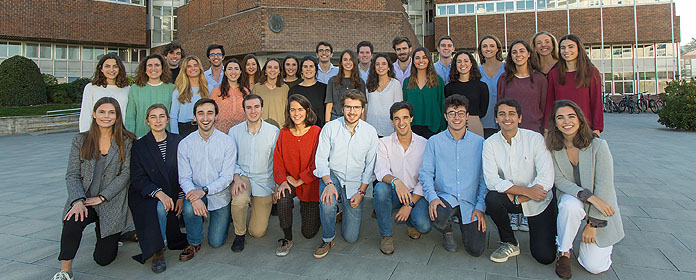"The solution to skin cancer is through prevention."
Dr. Emilio Quintanilla, director of department of Dermatology of the University Clinic, presented the V congress National Nursing Dermatology "Sun and skin".
"In the face of skin cancer, dermatologists do not have to create an alarmist or panicky awareness, but we must educate patients, because the solution to this problem lies in prevention". This was stated at the University Clinic of Navarra by Dr. Emilio Quintanilla, director of the department of Dermatology, during the presentation of the V National congress of Dermatological Nursing, which under the slogan "Sun and skin" was held at the University of Navarra on May 18, 19 and 20.
According to Dr. Quintanilla, "the sun and the skin are a topical topic , which has evolved especially over the years. Dermatology in this aspect used to be an eminently clinical specialization program but, for some time now, two variants have been introduced that have enriched it: surgery and cosmetics". For the dermatologist, "we must give great importance to solar prevention as a predisposing factor for skin cancer".
Regarding melanomas, produced mainly by ultraviolet radiation, Dr. Quintanilla explained that "it is a mistake to think that they are always dark, like moles. Sometimes they can be the same color as the skin, and their symptoms are usually an increase in the size of the lesion, a change in its color or edges, spontaneous bleeding or a discreet itching.
Twenty years ago," he continued, "we never imagined that sunbathing would be so harmful. To avoid development melanoma, you have to protect yourself especially in the first years of life. Other factors also play a role, such as the hole in the ozone layer".
For her part, the nurse Carmen Elarre, president of congress and nurse at department of Dermatology at the Clínica Universitaria, gave some advice on sunbathing for the summer. The nurse made it clear that "sun yes, but with photoprotection. As a minimum, you should use factor 15, which covers approximately 90%, and apply it average hour before exposure to the sun and repeat it every two hours. Peak sun hours should be avoided (from 11 a.m. to 4 p.m.), and it should be remembered that the higher the altitude, the greater the danger".
In this regard, Dr. Quintanilla took the opportunity to clarify a very common mistake: thinking that when a person is bathing or under the umbrella at the beach, he or she is not at risk of getting a sunburn. According to him, "a magnifying glass effect is produced that increases sunburn".
The V National congress of Dermatological Nursing is organized by the department of Dermatology of the Clínica Universitaria de Navarra, at partnership with the University School of Nursing of the University of Navarra. According to Carmen Elarre, "the idea arose in Madrid in 1998, during the celebration of the IV congress, and the intention is to transmit new knowledge in the area of dermatological nursing and to share experiences among professionals from the different Spanish communities".
Regarding the main goal of the meetings, Mª Isabel Saracíbar, director of the University School of Nursing of the University of Navarra, added that "the research of nurses in the area dermatology is very important because it is a specific field based on the internship. Throughout the nine years of life of the congress the tasks of the staff dermatological nursing have been reviewed, and it has been discovered that there is a very large field of research".
"In addition," she continued, "we studied the interdisciplinary role played by the nurse in medical treatment. Nurses should reflect on what they have done so far and what is the future of the profession in this specialization program".

